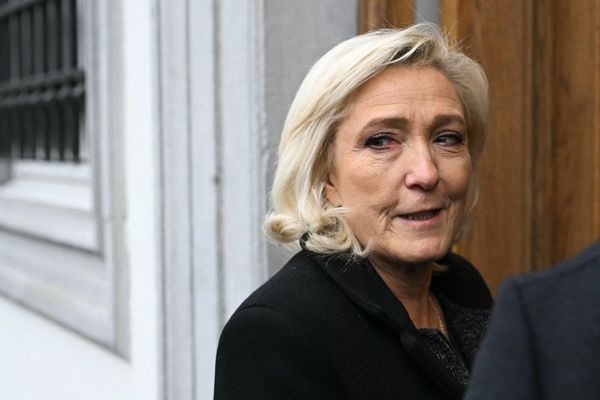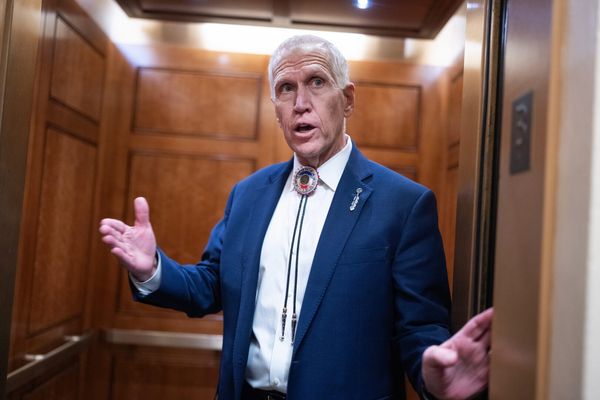
A federal judge in San Francisco on Monday began hearing evidence and arguments on whether the Trump administration violated federal law when it deployed national guard soldiers and US marines to Los Angeles after protests over immigration raids this summer.
The Trump administration federalized California national guard members and sent them to the second-largest US city over the objections of the California governor, Gavin Newsom, and city leaders, after protests erupted on 7 June when Immigration and Customs Enforcement (Ice) officers arrested people at multiple locations.
California is asking Judge Charles Breyer to order the Trump administration to return control of the remaining troops to the state and to stop the federal government from using military troops in California “to execute or assist in the execution of federal law or any civilian law enforcement functions by any federal agent or officer”.
“The factual question which the court must address is whether the military was used to enforce domestic law, and if so, whether there continues to be a threat that it could be done again,” Breyer said at the start of Monday’s court hearing.
The 1878 Posse Comitatus Act prevents the president from using the military as a domestic police force. The case could set precedent for how Trump can deploy the guard in the future in California or other states.
Trump’s decision to deploy the troops marked the first time in 60 years that a US president had taken such a step without a governor’s consent. Critics say that Trump’s actions in many ways reflect a strongman approach by a president who has continually trodden upon norms and has had a disregard for institutional limits.
“This is the first, perhaps, of many,” Trump said in June of the deployment of national guard troops in Los Angeles. “You know, if we didn’t attack this one very strongly, you’d have them all over the country, but I can inform the rest of the country, that when they do it, if they do it, they’re going to be met with equal or greater force.”
Many of the troops have been withdrawn, but Rob Bonta, California’s attorney general, said on Sunday that 300 national guard troops remain in the state. The Trump administration last week extended the activation of troops in the LA area through 6 November, according to a court filing by Newsom.
“The federal government deployed military troops to the streets of Los Angeles for the purposes of political theater and public intimidation,” Bonta said in a statement. “This dangerous move has no precedent in American history.”
The hearing comes the same day Trump placed the DC Metropolitan police department under federal control and deployed the national guard by invoking section 740 of the District of Columbia Home Rule Act.
The US defense secretary, Pete Hegseth, has said national guard units would take to the streets of DC over the coming week.
The Department of Defense ordered the deployment of roughly 4,000 California national guard troops and 700 marines. Most of the troops have since left but 250 national guard members remain, according to the latest figures provided by the Pentagon. The remaining troops are at the Joint Forces training base in Los Alamitos, according to Newsom.
Newsom won an early victory from Breyer, who found the Trump administration had violated the 10th amendment, which defines power between federal and state governments, and exceeded its authority.
The Trump administration immediately filed an appeal arguing that courts cannot second-guess the president’s decisions and secured a temporary halt from the appeals court, allowing control of the California national guard to stay in federal hands as the lawsuit continues to unfold.
After their deployment, the soldiers accompanied federal immigration officers on immigration raids in Los Angeles and at two marijuana farm sites in Ventura county while marines mostly stood guard around a federal building in downtown Los Angeles that includes a detention center at the core of protests.
The Trump administration argued the troops were needed to protect federal buildings and personnel in Los Angeles, which has been a battleground in the federal government’s aggressive immigration strategy. Since June, federal agents have rounded up immigrants without legal status to be in the US from Home Depots, car washes, bus stops and farms. Some US citizens have also been detained.
Ernesto Santacruz Jr, the field office director for the Department of Homeland Security in Los Angeles, said in court documents that the troops were needed because local law enforcement had been slow to respond when a crowd gathered outside the federal building to protest against the 7 June immigration arrests.
“The presence of the national guard and marines has played an essential role in protecting federal property and personnel from the violent mobs,” Santacruz said.
After opposition from the Trump administration, Breyer issued an order allowing California’s attorneys to take Santacruz’s deposition. They also took a declaration from a military official on the national guard and marines role in Los Angeles.
The Trump administration’s attorneys argued in court filings last week the case should be canceled because the claims under the Posse Comitatus Act “fail as a matter of law”. They argued that there was a law that gives the president the authority to call on the national guard to enforce US laws when federal law enforcement is not enough.
Trump federalized members of the California national guard under Section 12406 of Title 10, which allows the president to call the national guard into federal service when the country “is invaded”, when “there is a rebellion or danger of a rebellion against the authority of the Government” or when the president is otherwise unable “to execute the laws of the United States”.
Breyer found the protests in Los Angeles “fall far short of ‘rebellion”.
“Next week’s trial is not cancelled,” he said in a ruling ordering the three-day, non-jury trial.
During the month the protests took place, tensions heightened between Trump and Newsom. The California governor compared the president to failed dictators and Trump entertained the idea of having Newsom arrested.







